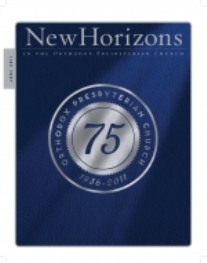OPC 75th AnniversaryJune 26, 2011
Excerpt from New Horizons, "The OPC at 75: Why We Celebrate" by John R. Muether "To be sure, the past can be an impediment to the health of a community. Embracing a perceived golden age of former times may promote a fixation on a frozen past that is largely the product of one's imagination. 'The Psalter is wide awake to the significance of history as leading up to the eschatological act of God. It knows that it deals with a God, who spake and speaks and shall speak, who wrought and works and shall work, who came and is coming and is about to come. To no small extent it is the dignity of Jehovah as Creator and Redeemer from which the eschatological necessity springs.... Jehovah cannot abandon the works of his own hands (Psalm 138:8); he will perfect that which concerns his people. His work must appear unto his servants, his glory unto their children (90:16).' "'For the people of God, the past is prologue, and reflection on God's faithfulness in history yields, in Vos's words, a "serene confidence and quiet expectation.' "Of course, the history of the OPC is not redemptive history. It does not describe the mighty saving acts of God through the person and work of Christ, as recorded by inspired prophets and apostles. OPC history is the story of God's providence in the affairs of one corner of the kingdom of God, as interpreted by fallible observers. So we must concede that it is tempting to misread history, especially on anniversaries. |






